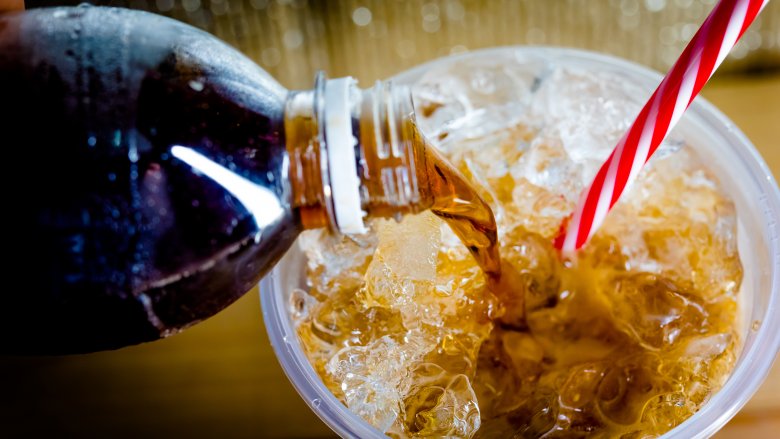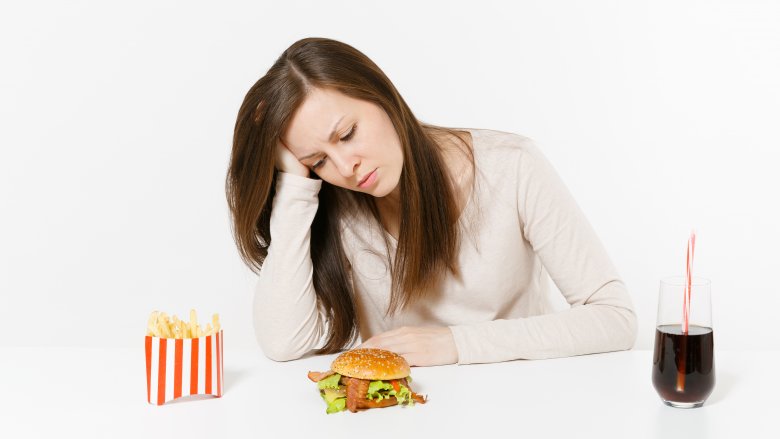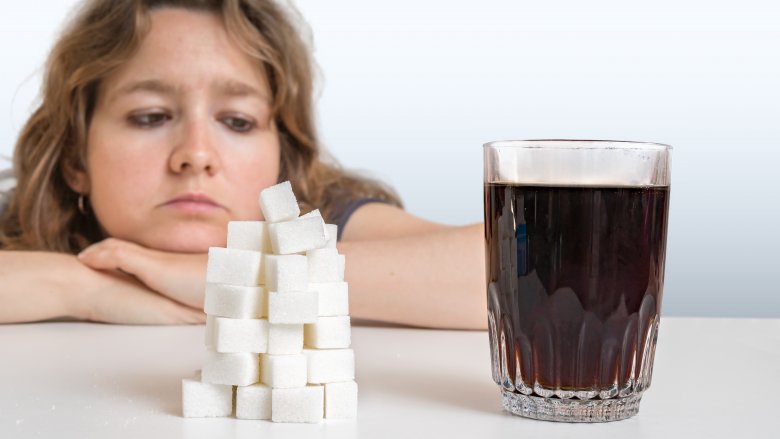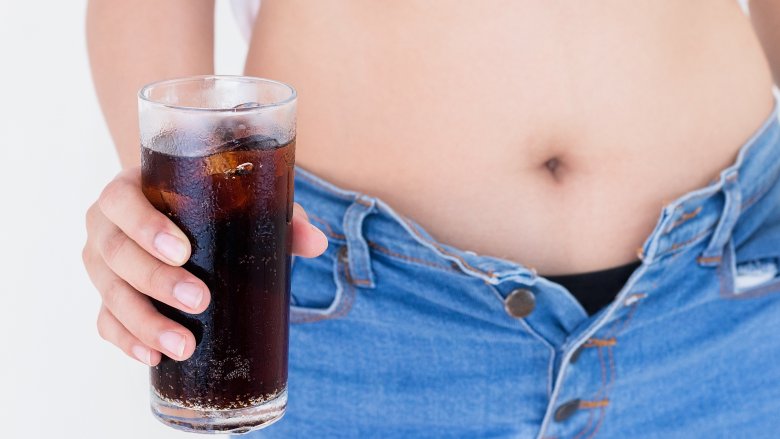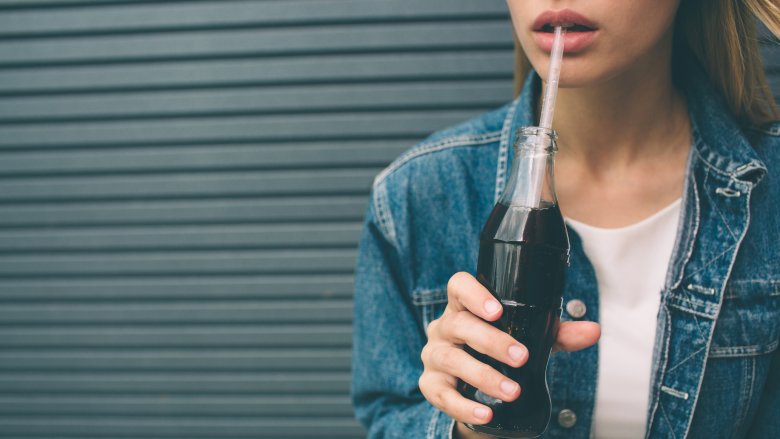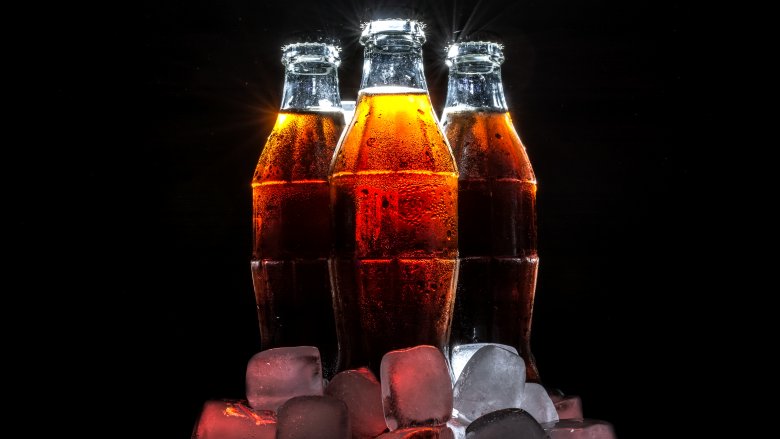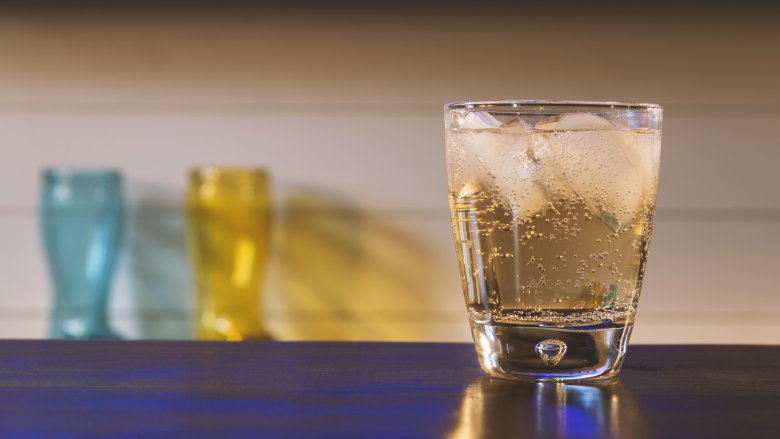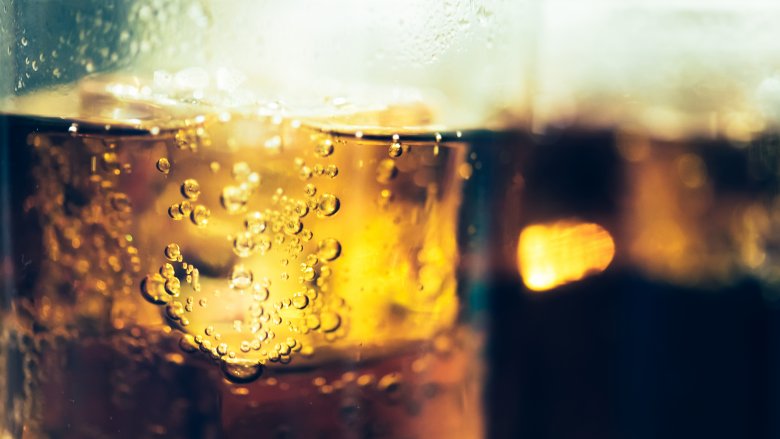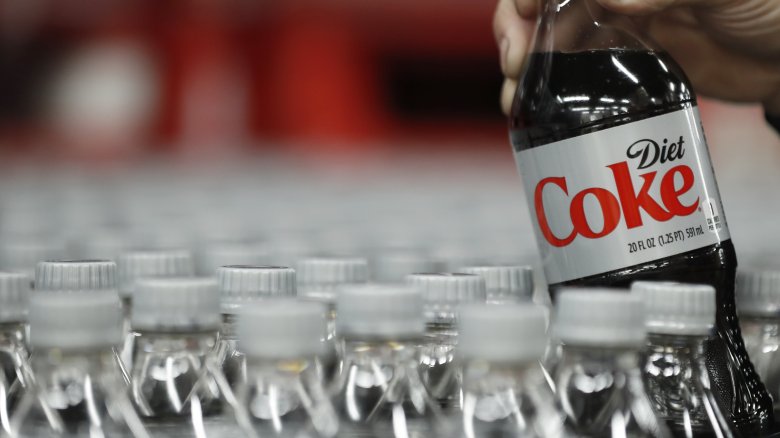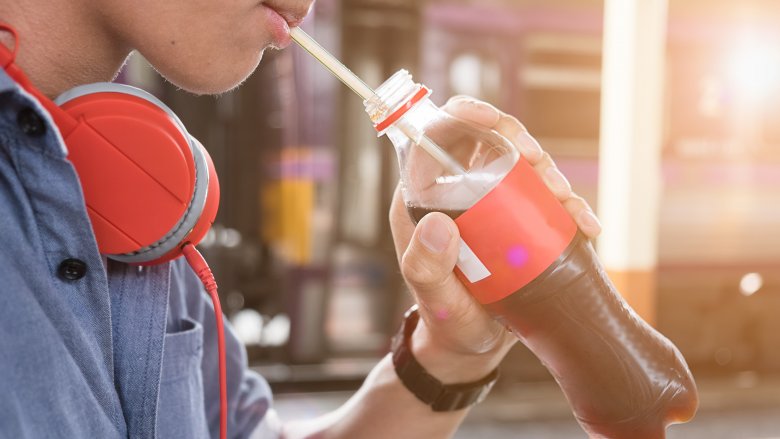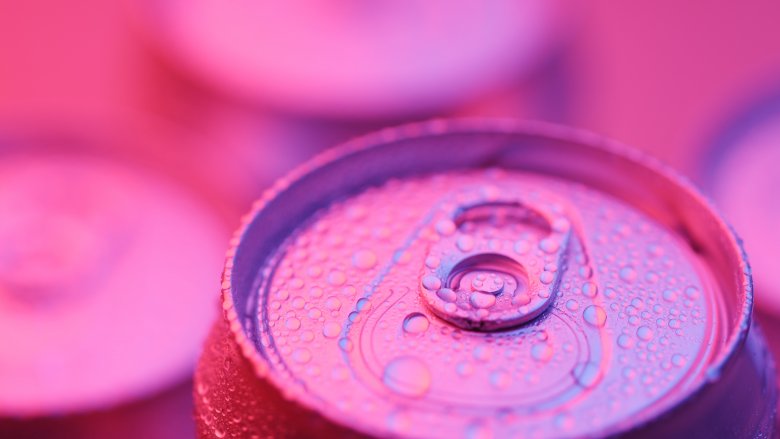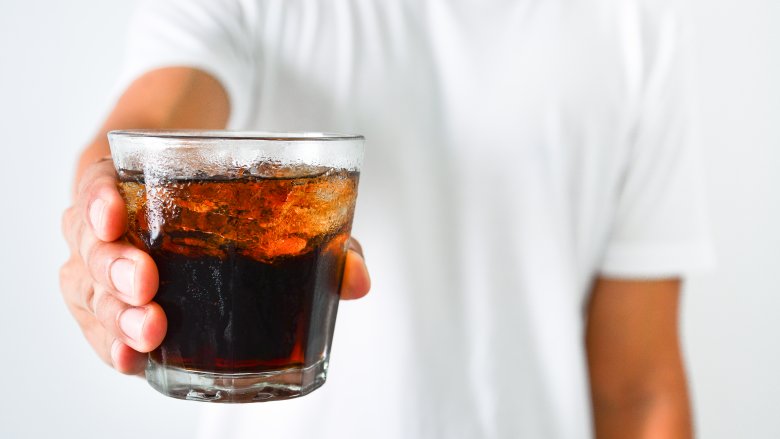The Untold Truth Of Diet Soda
If you're a fan of soda, you probably know just how bad for you it can be. But diet soda, that's better, right?
The answer is only, "sort of..." even though it's recommended by the American Diabetes Association as a viable alternative for people needing to manage their blood glucose levels. According to the ADA, diet soda's non-nutritive sweeteners don't have the same impact on our bodies as sugar does, but it might not be that straightforward. There have been numerous studies that suggest the ingredients we're using to replace sugar with might be doing more harm than good, and that's a scary idea — especially considering we all know those people who chug diet soda like it's their job.
According to Business Insider, there are actually six different artificial sweeteners approved by the FDA for use in diet sodas. They also say that even though they're approved for our consumption, we're still not entirely sure just how good for us they are. There are some disturbing findings out there, so let's talk about the dark side of diet soda and the strange way we became obsessed with it.
Sweets won't be as sweet
In 2012, the results of a study were released suggesting diet soda is doing something to your brain on a cellular level. Researchers compared the MRIs of people who drank diet sodas with those who didn't, and found there was a definite difference in what they saw. It was centered around the caudate nucleus.
First, a quick biology lesson. Healthline says the caudate nucleus is the part of the brain you tap into when you're looking for a specific memory you need to help you make a decision, and that's important for our discussion.
The study found that the more diet soda someone drank, the less their caudate nucleus was activated by the presence of sweetness. Couple that with the activity seen in the reward-processing centers of the brain, and researchers realized that diet soda drinkers were getting less pleasure from the sweetness they were getting from their diet drinks. That interference with with the brain's reward system is likely what leads to diet soda drinkers consuming way more than they might intend — they're not getting the satisfaction they crave. The study (via Business Insider) even suggests the interference might damage the way diet soda drinkers enjoy all tastes, including food.
Your body doesn't like being faked out
When Purdue University led a research team that reviewed around a dozen studies done on diet sodas, they said (via CNN) they were "shocked" by what they found. At the heart of it is your body's inability to deal with artificial sweeteners.
PBS talked to the team, too, who said diet soda is doing to your body what you do to a dog when you only pretend to throw a ball. Your body needs sugar and glucose to function, and it craves it. When you give it artificial sweeteners instead, your body doesn't know what to do with that — just like our erstwhile dog, who's looking for the ball you didn't throw. The dog's going to catch on eventually, and your body does the same thing. Just like the dog isn't going to play your stupid games anymore, your body alters its metabolism and the way it processes real sugar when it finally does get it. You can think of it as your body over-correcting for not getting the things it really needs, and the more artificial sweeteners — and diet soda — you drink, the worse the effect gets.
It can alter your gut bacteria
You've probably heard of gut bacteria, the 100 trillion bacteria that live in your digestive tract. Harvard Health says the makeup of our gut bacteria has been linked to everything from heart health to arthritis, and it turns out that diet soda is changing your gut bacteria.
And not for the better. In 2015, a team of Israeli researchers released the results of a study that suggested artificial sweeteners encouraged the growth of a particular type of bacteria: the type that turns our food into useable calories. Bacteria and metabolism expert Peter Turnbaugh says (via Scientific American) that when these bacteria multiply, that exposes us to more calories that can end up turning into fat and leading to obesity.
There's some good news here, at least. The ecosystem of bacteria living in your gut is always changing, and the researchers found they could reverse the damage done by artificial sweeteners. They dosed their mice with antibiotics and saw their gut bacteria return to normal, but they did stress findings suggested if it's not corrected, diet sodas can ultimately contribute to weight gain, an increased risk of heart disease, and other health problems.
Diet soda addiction is very real
Doctors from the Global Healing Center say artificial sweeteners activate reward centers in the brain, and now that we know how much interference those sweeteners cause, it's easy to see how we're left trying to satisfy a craving diet soda never will.
You're not alone if that's you. Bella Mackie wrote about her 3-liter-a-day habit for The Guardian, saying cutting it out left her craving a fix. She successfully turned her back on it, and like her, journalist Charlotte Burns found ditching the diet soda "harder to quit than smoking." She told The Huffington Post that she would get panicked if she thought she might even be close to running out, and estimates she spent £20,000 (or $25,000) on diet soda alone.
Today gives some advice to anyone trying to give it up: Start slow, and replace it with things that will trick your body into not missing it as much. An extra cup of coffee will fight the exhaustion, use a dash of real sugar, and cut your juice with club soda or seltzer to mimic the fizzy texture you'll be missing, too. Whey protein and a glass of wine at night can also help take the edge off cravings.
It's associated with depression
Just what diet soda's association with depression is, is still up in the air. Researchers stress there's little out there that suggests diet soda causes depression, but there's definitely a link and it's a pretty fascinating one.
The National Institutes of Health (via Smithsonian) conducted a study that surveyed the drinking habits of 263,925 adults. They were looking at all kinds of drinks, from coffee and soda to fruit punch and tea. They found participants who drank more than four cans of sweetened drinks per day had a much, much higher chance of being clinically diagnosed with depression.
When they looked at soda, regular soda-drinkers had a 30 percent higher chance of a diagnosis, while diet soda drinkers had a whopping 52 percent higher chance. (For some perspective, coffee drinkers had a 10 percent lower chance of being diagnosed.)
They stress they're not saying drinking diet soda causes depression, but say extreme consumption might be a marker there's something else at work here contributing to mental health issues.
It was originally created for sanitarium patients
Given all the debate about just how healthy modern diet sodas are, it's a bit surprising that it was originally created to be a super-healthy drink that was an excellent option for sanitarium patients suffering from things like diabetes and heart disease.
In 1952, Hyman Kirsch was vice president of the Jewish Sanitarium for Chronic Disease in Brooklyn. He — and his son, Morris — wanted to create a tasty drink for patients that couldn't drink regular sodas because of their health concerns. That became No-Cal, a sugar-free drink that originally came in black cherry and ginger ale. They were so popular he eventually founded Kirsch Beverages, with a line of sodas like Kirsch Real Fruit Flavored Tee Up Lemon Soda.
According to American Heritage, Kirsch's success was born in the laboratory. He and his team experimented with a ton of artificial sweeteners, most of which left an unpleasant, metallic taste. The winner was cyclamate calcium, and if that sounds vaguely familiar, there's a good reason for that: it's deadly.
It made (and destroyed) one soda company
Kirsch's product was regionally successful, and it wasn't until 1961 that the first big beverage producer saw enough value in the idea of a diet drink to make their own. That was Royal Crown Cola, and the drink was Diet Rite. It was a massive success that set RC Cola up to be a competitor with Coke and Pepsi, but there was a big problem.
Diet Rite, says Mental Floss, was RC Cola's biggest seller. But by the mid-1960s, there was more research being done into cyclamate, which had already been deemed safe by the FDA. It was suddenly being linked to cancer, tumors, and deformities, leading to the FDA revoking cyclamate's "Generally Recognized as Safe" designation. RC Cola had the biggest, most high-profile drink that used it, and they took the hardest hit. While they claimed the whole thing was a set-up organized by the sugar industry (cyclamate is widely recognized as safe in numerous countries today), it still toppled a company poised to be a beverage giant.
And that's how diet soda largely ended the popularity of the company that made it visible.
Coca-Cola didn't want to be associated with it
While RC Cola made their name on diet soda, Coca-Cola dragged their feet on making their own version because they didn't even want to be associated with the idea of a diet soda.
That's where TaB came in, says Snopes. While most of the rumors about TaB aren't true, it is true that the parent company of Coca-Cola released their first diet soda through one of their subsidiary companies — Fanta — because they didn't want a diet product. TaB came out in 1963, and it wasn't until 1982 that Diet Coke hit the shelves after two decades of behind-the-scenes debate.
There was a lot less work that went into TaB, right down to the name. There were a ton of theories about why it was called TaB, but the truth is that it was simply a name picked from a list of 2,300,000 short names generated by a Coca-Cola's IBM 1401 mainframe computer. The weird capitalization was done by the design department, and once Coke released their own diet drink, TaB largely fell by the wayside.
There are environmental impacts to consider
The sugar industry has had a devastating impact on the environment, from habitat loss to water consumption and the use of chemicals that ultimately end up destroying ecosystems (via WWF). Surely, sugar-free diet sodas should be the better option, right?
Not so fast. According to Scientific American, there's a weird thing that happens when artificial sweeteners like sucralose end up in the environment: they don't degrade. They're so resilient they make it through the human digestive system and through water treatment plants, and since no natural organism recognizes it as food, it stays in the environment. That makes it valuable as a tracer that allows environmentalists to track pollution, but what else happens?
We're still not sure. Stanford's Sound Advice for a Green Earth (SAGE) says that when these compounds react with sunlight and break down, they're sometimes toxic. That might mean an increased use of artificial sweeteners is doing some major damage, damage we'll need to overhaul our water treatment processes in order to prevent. Not looking so environmentally friendly now, is it?
Here's why diet sodas taste funny (and it's not the sweetener)
Diet sodas have a funny taste that's little bit metallic, and a funky aftertaste. Weirdly, it's not caused by what you think.
When researchers from the University of Illinois (via LiveScience) looked into just where that funky taste comes from, they found it wasn't actually a taste after all. It was texture.
They worked with a dozen people to hone their abilities to rate the mouth-feel of both regular and diet sodas, becoming so good at it that they could tell the difference between samples that laboratory equipment found were barely different. They found that even the smallest, slightest differences in the texture of diet sodas meant people — and not only ones that had been trained in mouth-feel science — recognize that something isn't right. It doesn't feel like it's supposed to when you drink it, so it doesn't taste like it's supposed to, either. They key to a successful diet drink is mimicking texture, too, and they found that lemon-lime flavors help to do that a bit — which is why lemon-lime diet sodas are usually better than their cola counterparts. Now you know.
Sink or swim
Regular soda has sugar and diet soda has artificial sweeteners, but how much difference does that really make? You can see it for yourself with a nifty experiment from Steve Spangler Science. It's easy, too. Just fill any decent-sized container with water, then toss in a can of regular soda and a can of diet. The diet will float, but the regular will sink. That's because the sugar makes the regular soda heavier, and adds enough mass to the can that it's going to sink.
He also gets into just how much sugar is actually in that can of regular soda: about ten packets worth.
UC Santa Barbara goes into a little more detail about what's going on here, and it doesn't actually have to do with the weight of sugar versus the weight of an equal amount of artificial sweetener. Since the artificial stuff is much, much more concentrated, it doesn't take as much to get the right level of sweetness.
Deceptive marketing?
What's in a word? What's in the word "diet," specifically? If you see something labeled "diet," do you think it's going to be good for you, or that it'll help you lose weight?
That's the question at the heart of a lawsuit that Reuters says was ultimately dismissed in 2018, but you can see how it would be an issue. According to the suit, Coca-Cola was using deceptive marketing techniques that made people think Diet Coke was a weight loss drink. That included things like ads featuring well-muscled people, and just marketing it as "diet" in spite of the fact it's been linked to things like diabetes.
The ruling is an important one, too. It was ruled that there was no concrete evidence that diet soda causes weight gain or contributes to other health conditions, and in order to successfully sue, the plaintiff was told that the proof must be concrete. For now, Diet Coke is still "diet." Whether you trust that or not, is up to you.
